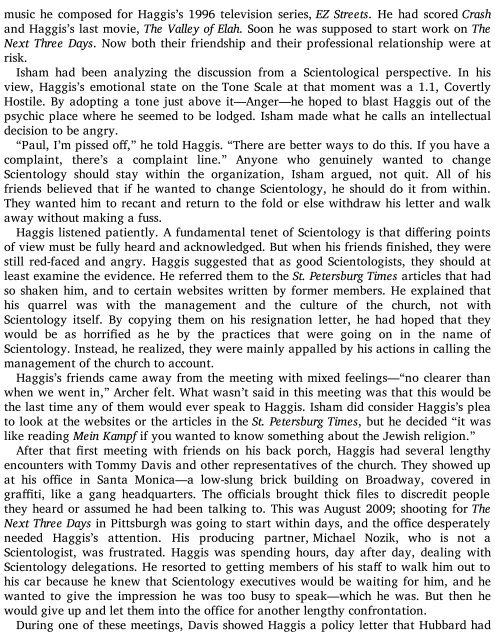going-clear-scientology-hollywood-and-the-prison-of-belief-by-lawrence-wright-2
going-clear-scientology-hollywood-and-the-prison-of-belief-by-lawrence-wright-2
going-clear-scientology-hollywood-and-the-prison-of-belief-by-lawrence-wright-2
Create successful ePaper yourself
Turn your PDF publications into a flip-book with our unique Google optimized e-Paper software.
music he composed for Haggis’s 1996 television series, EZ Streets. He had scored Crash<br />
<strong>and</strong> Haggis’s last movie, The Valley <strong>of</strong> Elah. Soon he was supposed to start work on The<br />
Next Three Days. Now both <strong>the</strong>ir friendship <strong>and</strong> <strong>the</strong>ir pr<strong>of</strong>essional relationship were at<br />
risk.<br />
Isham had been analyzing <strong>the</strong> discussion from a Scientological perspective. In his<br />
view, Haggis’s emotional state on <strong>the</strong> Tone Scale at that moment was a 1.1, Covertly<br />
Hostile. By adopting a tone just above it—Anger—he hoped to blast Haggis out <strong>of</strong> <strong>the</strong><br />
psychic place where he seemed to be lodged. Isham made what he calls an intellectual<br />
decision to be angry.<br />
“Paul, I’m pissed o,” he told Haggis. “There are better ways to do this. If you have a<br />
complaint, <strong>the</strong>re’s a complaint line.” Anyone who genuinely wanted to change<br />
Scientology should stay within <strong>the</strong> organization, Isham argued, not quit. All <strong>of</strong> his<br />
friends believed that if he wanted to change Scientology, he should do it from within.<br />
They wanted him to recant <strong>and</strong> return to <strong>the</strong> fold or else withdraw his letter <strong>and</strong> walk<br />
away without making a fuss.<br />
Haggis listened patiently. A fundamental tenet <strong>of</strong> Scientology is that diering points<br />
<strong>of</strong> view must be fully heard <strong>and</strong> acknowledged. But when his friends nished, <strong>the</strong>y were<br />
still red-faced <strong>and</strong> angry. Haggis suggested that as good Scientologists, <strong>the</strong>y should at<br />
least examine <strong>the</strong> evidence. He referred <strong>the</strong>m to <strong>the</strong> St. Petersburg Times articles that had<br />
so shaken him, <strong>and</strong> to certain websites written <strong>by</strong> former members. He explained that<br />
his quarrel was with <strong>the</strong> management <strong>and</strong> <strong>the</strong> culture <strong>of</strong> <strong>the</strong> church, not with<br />
Scientology itself. By copying <strong>the</strong>m on his resignation letter, he had hoped that <strong>the</strong>y<br />
would be as horried as he <strong>by</strong> <strong>the</strong> practices that were <strong>going</strong> on in <strong>the</strong> name <strong>of</strong><br />
Scientology. Instead, he realized, <strong>the</strong>y were mainly appalled <strong>by</strong> his actions in calling <strong>the</strong><br />
management <strong>of</strong> <strong>the</strong> church to account.<br />
Haggis’s friends came away from <strong>the</strong> meeting with mixed feelings—“no <strong>clear</strong>er than<br />
when we went in,” Archer felt. What wasn’t said in this meeting was that this would be<br />
<strong>the</strong> last time any <strong>of</strong> <strong>the</strong>m would ever speak to Haggis. Isham did consider Haggis’s plea<br />
to look at <strong>the</strong> websites or <strong>the</strong> articles in <strong>the</strong> St. Petersburg Times, but he decided “it was<br />
like reading Mein Kampf if you wanted to know something about <strong>the</strong> Jewish religion.”<br />
After that rst meeting with friends on his back porch, Haggis had several lengthy<br />
encounters with Tommy Davis <strong>and</strong> o<strong>the</strong>r representatives <strong>of</strong> <strong>the</strong> church. They showed up<br />
at his oce in Santa Monica—a low-slung brick building on Broadway, covered in<br />
grati, like a gang headquarters. The ocials brought thick les to discredit people<br />
<strong>the</strong>y heard or assumed he had been talking to. This was August 2009; shooting for The<br />
Next Three Days in Pittsburgh was <strong>going</strong> to start within days, <strong>and</strong> <strong>the</strong> oce desperately<br />
needed Haggis’s attention. His producing partner, Michael Nozik, who is not a<br />
Scientologist, was frustrated. Haggis was spending hours, day after day, dealing with<br />
Scientology delegations. He resorted to getting members <strong>of</strong> his sta to walk him out to<br />
his car because he knew that Scientology executives would be waiting for him, <strong>and</strong> he<br />
wanted to give <strong>the</strong> impression he was too busy to speak—which he was. But <strong>the</strong>n he<br />
would give up <strong>and</strong> let <strong>the</strong>m into <strong>the</strong> <strong>of</strong>fice for ano<strong>the</strong>r lengthy confrontation.<br />
During one <strong>of</strong> <strong>the</strong>se meetings, Davis showed Haggis a policy letter that Hubbard had


